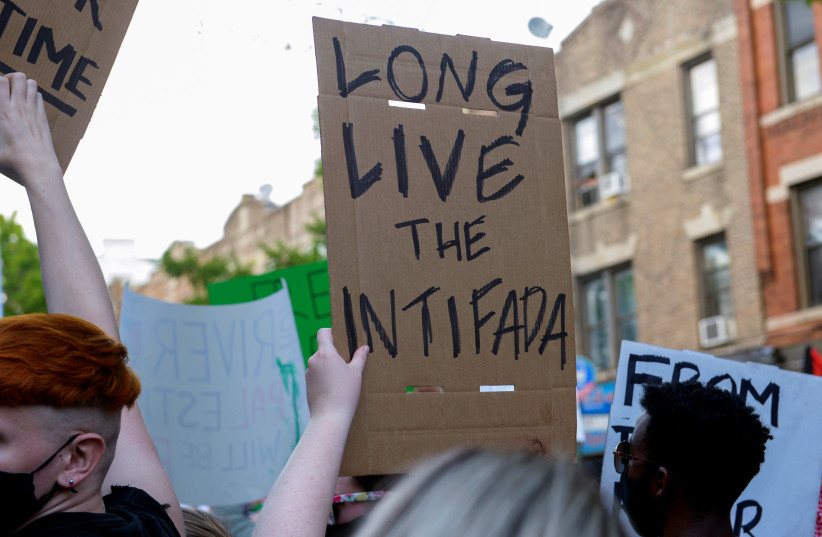It’s Jew-hating time, again. No cross-burnings, or bomb-wearing psychos screaming for Allah. It’s sophisticated, draped by UN and EU glitz, banal reports about Israeli atrocities, and Palestinian liberation. It’s so holy, so morally pompous, and fashionable.
Criticizing Israel doesn’t lack for issues: “apartheid,” “war crimes,” “stealing Palestinian land,” “oppressing Palestinians,” “the occupation,” etc.
NGOs funded by European governments, the UN, and most Arab and Muslim organizations and countries condemn Israel as a pariah state, unworthy of existence. In this pogrom of conscience, they wear no hoods. Their masks are self-righteousness.
The mechanism for vilification and delegitimization, BDS campaigns, is coordinated by the Palestinian BDS National Committee, an umbrella organization for dozens of Palestinian organizations, located in Ramallah and supported by the Palestinian Authority. A global movement, it is behind the spread of anti-Israel actions by churches, unions and student groups.
The mantra chants are easy: “End the Occupation,” “Justice for the Palestinians,” “Peace Now.” No need to think about complicated issues; just blame Israel. And Hate. Lots of hate.

Anti-Israel campaigns overlap anti-Jewish sentiments.
This explains why hate-Israel campaigns garner support from atheists, anarchists and even some Christians; why young people wrap themselves in checkered scarves, like Arafat, and come to Israel in order to fight alongside Arabs, some placing themselves in danger; and why EU countries with hard-hit economies spend hundreds of millions of euros every year supporting anti-Israel organizations.
Backed by Islamists, especially Muslim Brotherhood-supported student organizations, hating Israel has become the campus rage. Meanwhile, university administrators have been obsessively neutral, and Jewish organizations excessively polite.
In addition, Israel has produced its own uber-critics – columnists who condemn Israel as “racist,” editors who recommend “raping” Israel, academics, literary figures and artists who support BDS, especially against Jews living in Judea and Samaria.
In order to understand delegitimization, therefore, we need to distinguish between those who seek Israel’s destruction, in one form or another, and those with legitimate, honest criticism. Since one of the pillars of democracy is freedom of speech, drawing the line between what is acceptable and what is not is often difficult. Self-criticism is essential; without it there cannot be growth. But self-criticism without limit, unbalanced and exaggerated, is self-destructive.
Challenging Israel’s identity as a nominally Jewish state might be acceptable if all states with official religions were rejected. Singling out Israel, therefore, is not only bigoted, it is a form of delegitimization, a softer denial of Israel’s right to exist.
The soft deniers protest their link with hard-line delegitimizers, arguing that they support Israel, but they are critical of its “racist policies,” its “illegal occupation of Arab lands,” its “colonialism.” The connection between criticism and full-blown hatred deepens when biased news stories and distorted rhetoric about Israeli “atrocities” and “war crimes” become self-defined truths, distortions of reality.
Decrying “the occupation as a moral disaster” for Israel, therefore, identifies Jews as immoral, a state-sponsored immorality, a legal and historical fraud that sharpens the sword of delegitimization, justifies BDS campaigns, and anti-Jewish violence.
When the Gaza Strip is portrayed as “a vast prison,” for example, then attacking the warden (Israel) is heroic, overthrowing the system that produced that prison is justified, and Hamas missiles are “self-defense.”
If a Jewish, democratic state is inherently discriminatory, indeed “racist,” those who oppose it can be honored as “freedom fighters.” If Israel “steals Arab lands,” then those who struggle to regain what is rightfully theirs are reasonable. If Israeli settlements are “illegal,” it is a crime that should be punished. This ugly portrait of Israel is intentional, one that has no descriptive shades, no positive images, or perspective. It is one-dimensional evil.
The power of propaganda is that it substitutes emotional kicks for critical thinking –a form of brainwashing. Delegitimizing Israel, therefore, needs to be reconsidered not only as an informational problem, but as a psychological, emotional assault on rationality.
For the first time in history, Christian and Muslim Jew-hatred, liberals, anarchists, fascists and communists, dictators and presidents have merged into a formidable coalition against Israel, an international, multi-faceted onslaught to bring Israel to its knees.
One of the mechanisms used to delegitimize Israel is promoting Palestinianism and a Palestinian state run by terrorists. Paradoxically, a “two-state” plan, instead of reducing resistance to Israel, increases it. This is because the prospect of Palestinian statehood and full sovereignty raises expectations that it will replace Israel, not accept her.
“[Palestinian leaders] never miss an opportunity to miss an opportunity.”
Abba Eban
This explains why Palestinian leaders “never miss an opportunity to miss an opportunity,” as Abba Eban famously said. It’s not due to a miscalculation. It’s exactly what they intend. It also explains why they can’t and won’t recognize Israel’s right to exist, refuse to negotiate the refugee issue, and reject any compromise on Jerusalem. The problem is not territorial, but existential.
Posing simple questions, therefore, reveals the dilemma: What kind of Israel is fully and wholeheartedly acceptable? Is the Nakba (Arabic for catastrophe, referring to Israel’s establishment in 1948) over? Will Arab/Islamic terrorism, violence and incitement cease with the establishment of a Palestinian state? What will bring an end to this conflict?
If the response is, “End Israel’s existence,” you know what you are fighting for. ■
The author is a PhD historian, writer and journalist.
